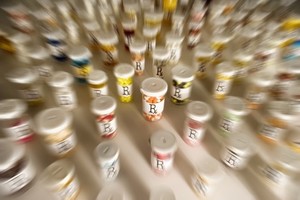Over the past few decades spending on prescription pharmaceuticals has increased faster than total health spending and gross domestic product in most OECD (Organisation for Economic Co-operation and Development) countries [1, 2].
In Greece, there is a lack of reliable data for observation and projection growth in pharmaceutical expenditures.
A bibliographic review of scientific articles containing information about medicines pricing was carried out. Also studies from companies that collected data from medicine sales internationally were reviewed. In addition, data were taken from the official medicines price list of Greece [3].
Today, generics account for 56% of all prescribed medicines, but for only 22% of the pharmaceutical expenditure or 2-4% of total healthcare costs, in Europe. Without generics, European payers would have had to pay Euros 100 billion more in 2014 to get the same level of access to treatment as we have today. The generics industry has increased access to medicines by over 100% in seven key therapeutic areas without increasing the overall treatment cost over the last 10 years [4, 5].
The mapping of Greek legislation for the health sector included 155 laws and regulations. Legislation included laws, legislative decrees, presidential decrees and ministerial/joint ministerial decisions.
According to the recent Law 4337/2016 the price of one off-patent medicine is predicted to be 50% of the price of an originator medicine, while a generic should be 65% of the price of an off-patent medicine. However, Ministerial Decision 28408/19.4.2016 states that generics may not be more expensive than off-patent medicines, identifying that the pricing as it is implemented in Greece, does not always comply with Law 4337/2017.
Even after the implementation of the ministerial decision, it has been observed that some generics are more expensive than off-patent medicines by up to 30%. With the new proposed pricing, the difference between the above categories can reach 100%. In contrast, the equivalent medicine in Spain is 66% cheaper. The official justification during pricing is that the particular medicine is not declared as the reference product or that there was no price found at the first distribution of the generic medicine. With that excuse, generics of wide use and high cost are sold at prices up to 200% more expensive than the originator. This is the main reason why generics sales in Greece are only 12.4% within three months after loss of exclusivity [5].
In comparison, over 75% of generics sales were attributed to medicines that had generic entry in the UK three months after loss of exclusivity, followed by Finland (71.6%), Germany (71.0%), France (65.1%) and Denmark (60.4%). The share of sales that did not have generics entry 24 months after loss of exclusivity was lowest in Denmark (9.6%), the UK (11.4%) and Germany (14.7%); and highest in Greece (58.8%), France (32.2%) and Portugal (29.9%) [6].
Greece is very close to the average share among OECD countries, according to the sales values of generics, while it is behind (less than half) according to the sales volume. Greece is the only country where the percentages of sales in terms of value and sales volume are almost equal.
There is the paradox that during the current financial crisis, the percentage in terms of value of the sum of on-patent and off-patent medicines has been almost stable and ranges from 83.52% to 85.48%, respectively. On the other hand, it is also observed that a decrease in off-patent medicines is followed by an increase in on-patent medicines and not by generics.
Despite the evidence, the existing pricing process in Greece introduces price ceilings defining which generics are eligible for downward price revision and a maximum reduction percentage of 15% for severe price reductions. The latter has the side effect of reducing consumers’ willingness to purchase generics since they align their prices with the prices of their direct competitors.
Conflict of interest
The authors of the research paper [3] did not provide any conflict of interest statement.
Abstracted by Ioannis Karafyllis, Industrial Management and Technology Department, University of Piraeus, Greece.
Related articles
Measures to increase generics use in Greece
Greece and Syria facing severe drug shortages
References
1. Ess S, Schneeweiss S, Szucs T. European healthcare policies for controlling drug expenditures. Pharmacoeconomics. 2003;21(2):89‑103.
2. Kanavos P, Ferrario A, Vandoros S, Anderson GF. Higher US branded drug prices and spending compared to other countries may stem partly from quick uptake of new drugs. Health Aff (Milwood). 2013;32(4):1‑9.
3. Karafyllis I, Variti L. Generics pricing: the Greek paradox. Stud Health Technol Inform. 2017;238:265‑8.
4. Medicines for Europe. IMS Institute for Healthcare Informatics. The role of generic medicines in sustaining healthcare systems: a European perspective [homepage on the Internet]. [cited 2018 Jan 12]. Available from: www.medicinesforeurope.com/wp-content/uploads/2016/03/IMS_Health_2015_-_The_Role_of_Generic_Medicines_in_Sustaining_Healthcare_Systems_-_A_European_Perspective.pdf
5. Health, IMS Guide to pack prices on IMS Midas Quantum. 2010. Intercontinental Medical Statistics–IMS Health Inc, Fairfield (CT); 2010:1‑90.
6. Kanavos P. Measuring performance in off patent drug markets: A methodological framework and empirical evidence from twelve EU Member States. Health Policy. 2014;118:229‑41.
Permission granted to reproduce for personal and non-commercial use only. All other reproduction, copy or reprinting of all or part of any ‘Content’ found on this website is strictly prohibited without the prior consent of the publisher. Contact the publisher to obtain permission before redistributing.
Copyright – Unless otherwise stated all contents of this website are © 2018 Pro Pharma Communications International. All Rights Reserved.








 0
0











Post your comment